
Question Number 129344 by bramlexs22 last updated on 15/Jan/21
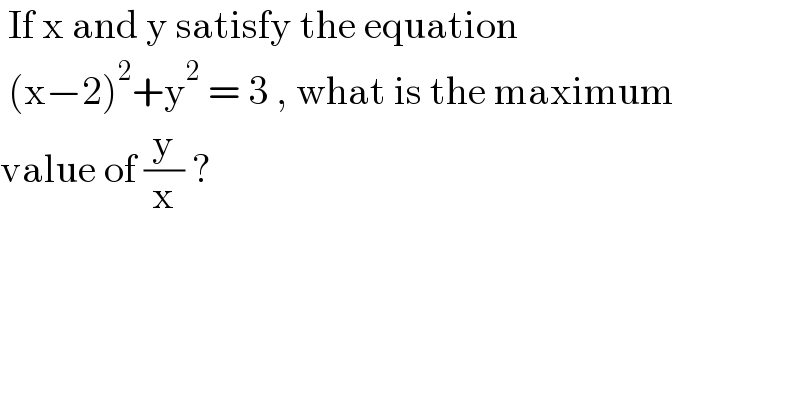
$$\:\mathrm{If}\:\mathrm{x}\:\mathrm{and}\:\mathrm{y}\:\mathrm{satisfy}\:\mathrm{the}\:\mathrm{equation}\: \\ $$$$\:\left(\mathrm{x}−\mathrm{2}\right)^{\mathrm{2}} +\mathrm{y}^{\mathrm{2}} \:=\:\mathrm{3}\:,\:\mathrm{what}\:\mathrm{is}\:\mathrm{the}\:\mathrm{maximum} \\ $$$$\mathrm{value}\:\mathrm{of}\:\frac{\mathrm{y}}{\mathrm{x}}\:? \\ $$
Answered by liberty last updated on 15/Jan/21
![f(x) = ((±(√(3−(x−2)^2 )))/x) = ((± (√(4x−x^2 −1)))/x) f ′(x)=± [(( x(((2−x)/( (√(4x−x^2 −1)))))−(√(4x−x^2 −1)))/x^2 ) ] =0 ⇒ ± (2x−x^2 −(4x−x^2 −1))=0 ⇒± (1−2x)=0 ⇒x = (1/2) f((1/2)) = ±((√(3−((1/2)−2)^2 ))/(1/2))=±2 (√(3/4)) ((y/x))_(max) = (√3) ; ((y/x))_(min) =−(√3)](Q129346.png)
$$\:\mathrm{f}\left(\mathrm{x}\right)\:=\:\frac{\pm\sqrt{\mathrm{3}−\left(\mathrm{x}−\mathrm{2}\right)^{\mathrm{2}} }}{\mathrm{x}}\:=\:\frac{\pm\:\sqrt{\mathrm{4x}−\mathrm{x}^{\mathrm{2}} −\mathrm{1}}}{\mathrm{x}} \\ $$$$\:\mathrm{f}\:'\left(\mathrm{x}\right)=\pm\:\left[\frac{\:\mathrm{x}\left(\frac{\mathrm{2}−\mathrm{x}}{\:\sqrt{\mathrm{4x}−\mathrm{x}^{\mathrm{2}} −\mathrm{1}}}\right)−\sqrt{\mathrm{4x}−\mathrm{x}^{\mathrm{2}} −\mathrm{1}}}{\mathrm{x}^{\mathrm{2}} }\:\right]\:=\mathrm{0} \\ $$$$\Rightarrow\:\pm\:\left(\mathrm{2x}−\mathrm{x}^{\mathrm{2}} −\left(\mathrm{4x}−\mathrm{x}^{\mathrm{2}} −\mathrm{1}\right)\right)=\mathrm{0} \\ $$$$\Rightarrow\pm\:\left(\mathrm{1}−\mathrm{2x}\right)=\mathrm{0}\:\Rightarrow\mathrm{x}\:=\:\:\frac{\mathrm{1}}{\mathrm{2}} \\ $$$$\mathrm{f}\left(\frac{\mathrm{1}}{\mathrm{2}}\right)\:=\:\pm\frac{\sqrt{\mathrm{3}−\left(\frac{\mathrm{1}}{\mathrm{2}}−\mathrm{2}\right)^{\mathrm{2}} }}{\frac{\mathrm{1}}{\mathrm{2}}}=\pm\mathrm{2}\:\sqrt{\frac{\mathrm{3}}{\mathrm{4}}} \\ $$$$\:\left(\frac{\mathrm{y}}{\mathrm{x}}\right)_{\mathrm{max}} =\:\sqrt{\mathrm{3}}\:\:;\:\left(\frac{\mathrm{y}}{\mathrm{x}}\right)_{\mathrm{min}} =−\sqrt{\mathrm{3}}\: \\ $$
Answered by mr W last updated on 15/Jan/21
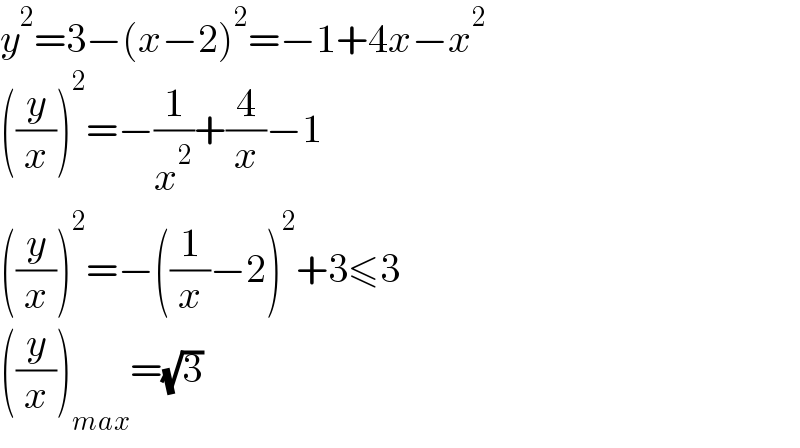
$${y}^{\mathrm{2}} =\mathrm{3}−\left({x}−\mathrm{2}\right)^{\mathrm{2}} =−\mathrm{1}+\mathrm{4}{x}−{x}^{\mathrm{2}} \\ $$$$\left(\frac{{y}}{{x}}\right)^{\mathrm{2}} =−\frac{\mathrm{1}}{{x}^{\mathrm{2}} }+\frac{\mathrm{4}}{{x}}−\mathrm{1} \\ $$$$\left(\frac{{y}}{{x}}\right)^{\mathrm{2}} =−\left(\frac{\mathrm{1}}{{x}}−\mathrm{2}\right)^{\mathrm{2}} +\mathrm{3}\leqslant\mathrm{3} \\ $$$$\left(\frac{{y}}{{x}}\right)_{{max}} =\sqrt{\mathrm{3}} \\ $$
Commented by liberty last updated on 15/Jan/21
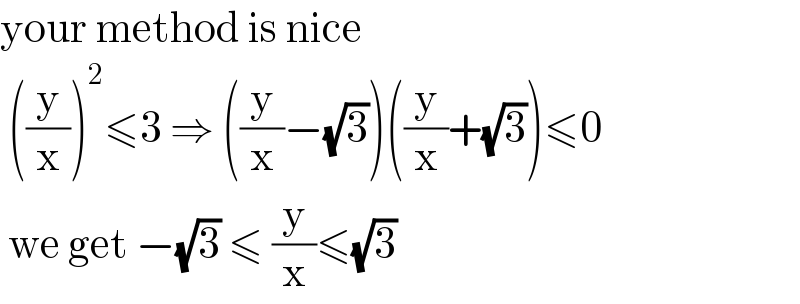
$$\mathrm{your}\:\mathrm{method}\:\mathrm{is}\:\mathrm{nice} \\ $$$$\:\left(\frac{\mathrm{y}}{\mathrm{x}}\right)^{\mathrm{2}} \leqslant\mathrm{3}\:\Rightarrow\:\left(\frac{\mathrm{y}}{\mathrm{x}}−\sqrt{\mathrm{3}}\right)\left(\frac{\mathrm{y}}{\mathrm{x}}+\sqrt{\mathrm{3}}\right)\leqslant\mathrm{0} \\ $$$$\:\mathrm{we}\:\mathrm{get}\:−\sqrt{\mathrm{3}}\:\leqslant\:\frac{\mathrm{y}}{\mathrm{x}}\leqslant\sqrt{\mathrm{3}}\: \\ $$
Commented by mr W last updated on 15/Jan/21

$${you}\:{are}\:{fast}! \\ $$
Commented by liberty last updated on 15/Jan/21

$$\mathrm{3}−\left(\mathrm{x}−\mathrm{2}\right)^{\mathrm{2}} =\mathrm{3}−\left(\mathrm{x}^{\mathrm{2}} −\mathrm{4x}+\mathrm{4}\right)=\mathrm{4x}−\mathrm{x}^{\mathrm{2}} −\mathrm{1} \\ $$
Commented by bramlexs22 last updated on 15/Jan/21

$$\mathrm{yes}..\mathrm{thanks} \\ $$
Answered by ajfour last updated on 15/Jan/21
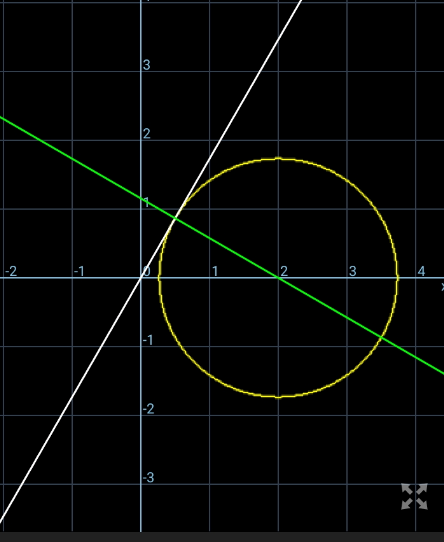
Commented by ajfour last updated on 15/Jan/21
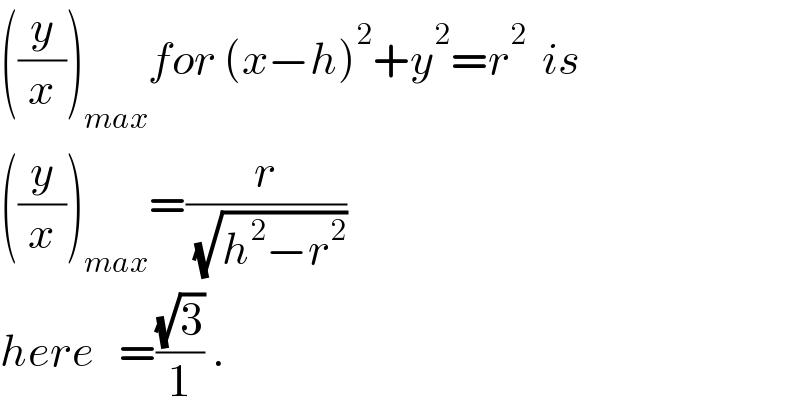
$$\left(\frac{{y}}{{x}}\right)_{{max}} {for}\:\left({x}−{h}\right)^{\mathrm{2}} +{y}^{\mathrm{2}} ={r}^{\mathrm{2}} \:\:{is} \\ $$$$\left(\frac{{y}}{{x}}\right)_{{max}} =\frac{{r}}{\:\sqrt{{h}^{\mathrm{2}} −{r}^{\mathrm{2}} }}\: \\ $$$${here}\:\:\:=\frac{\sqrt{\mathrm{3}}}{\mathrm{1}}\:. \\ $$
Commented by liberty last updated on 15/Jan/21

$$\frac{\mathrm{y}}{\mathrm{x}}=\mathrm{slope}\:=\:\frac{\mathrm{r}}{\mathrm{tan}\:\theta}=\frac{\sqrt{\mathrm{3}}}{\:\left(\sqrt{\mathrm{3}}\right)^{\mathrm{2}} −\left(\sqrt{\mathrm{2}}\right)^{\mathrm{2}} }=\sqrt{\mathrm{3}} \\ $$
Answered by Olaf last updated on 15/Jan/21
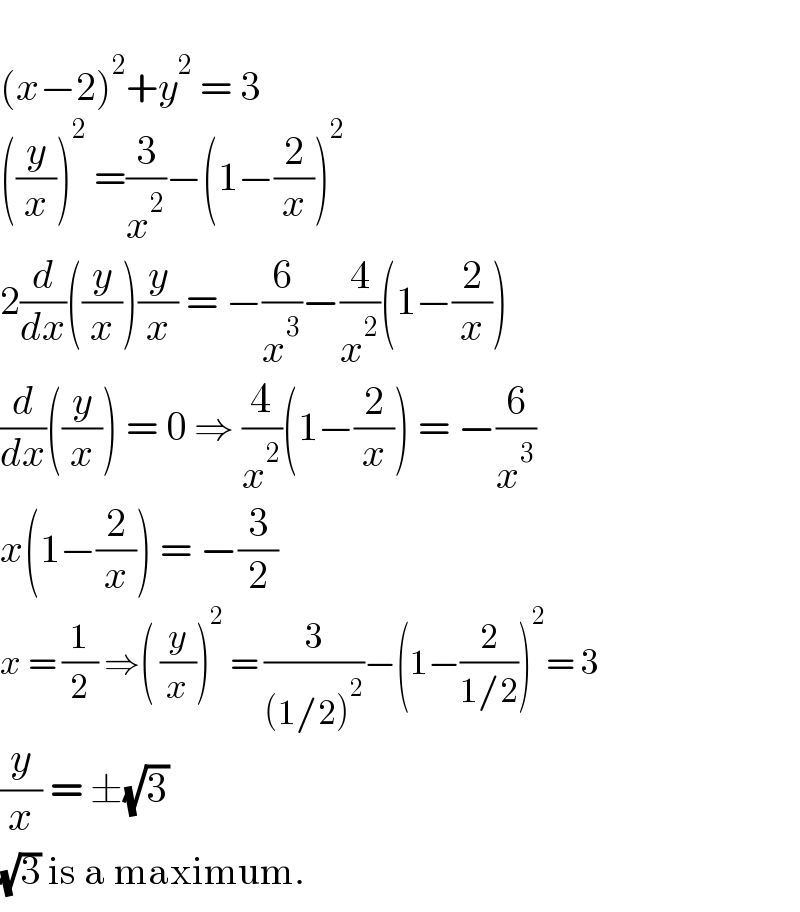
$$ \\ $$$$\left({x}−\mathrm{2}\right)^{\mathrm{2}} +{y}^{\mathrm{2}} \:=\:\mathrm{3} \\ $$$$\left(\frac{{y}}{{x}}\right)^{\mathrm{2}} \:=\frac{\mathrm{3}}{{x}^{\mathrm{2}} }−\left(\mathrm{1}−\frac{\mathrm{2}}{{x}}\right)^{\mathrm{2}} \\ $$$$\mathrm{2}\frac{{d}}{{dx}}\left(\frac{{y}}{{x}}\right)\frac{{y}}{{x}}\:=\:−\frac{\mathrm{6}}{{x}^{\mathrm{3}} }−\frac{\mathrm{4}}{{x}^{\mathrm{2}} }\left(\mathrm{1}−\frac{\mathrm{2}}{{x}}\right) \\ $$$$\frac{{d}}{{dx}}\left(\frac{{y}}{{x}}\right)\:=\:\mathrm{0}\:\Rightarrow\:\frac{\mathrm{4}}{{x}^{\mathrm{2}} }\left(\mathrm{1}−\frac{\mathrm{2}}{{x}}\right)\:=\:−\frac{\mathrm{6}}{{x}^{\mathrm{3}} } \\ $$$${x}\left(\mathrm{1}−\frac{\mathrm{2}}{{x}}\right)\:=\:−\frac{\mathrm{3}}{\mathrm{2}} \\ $$$${x}\:=\:\frac{\mathrm{1}}{\mathrm{2}}\:\Rightarrow\left(\:\frac{{y}}{{x}}\right)^{\mathrm{2}} \:=\:\frac{\mathrm{3}}{\left(\mathrm{1}/\mathrm{2}\right)^{\mathrm{2}} }−\left(\mathrm{1}−\frac{\mathrm{2}}{\mathrm{1}/\mathrm{2}}\right)^{\mathrm{2}} =\:\mathrm{3} \\ $$$$\frac{{y}}{{x}}\:=\:\pm\sqrt{\mathrm{3}} \\ $$$$\sqrt{\mathrm{3}}\:\mathrm{is}\:\mathrm{a}\:\mathrm{maximum}. \\ $$
